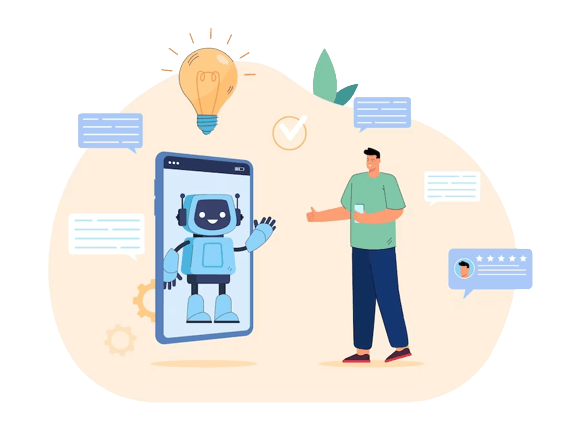Table of Content
- Understanding SEO
- The importance of SEO in Content Writing
- Introducing Chatgpt for SEO
- How chatgpt can boost rankings
- Leveraging chatgpt for content planning
- Utilizing Chatgpt for content promotion
- Optimizing ChatGPT Outputs for SEO
- Ethical considering and user experience
- Challenges and limitations of Chatgpt for SEO
- Best practices for using ChatGPT for SEO
- Conclusion
- FAQs
In today’s digital landscape, search engine optimization (SEO) plays a vital role in ensuring online content receives maximum visibility and organic traffic.
With the emergence of powerful language models, such as ChatGPT by OpenAI, content creators have a valuable tool at their disposal to enhance their SEO strategies.
In this article, we will explore how ChatGPT can be leveraged to boost rankings and drive more organic traffic to your website
1. Understanding SEO
To fully grasp the potential impact of ChatGPT on SEO, it’s crucial to have a solid understanding of SEO itself.
Search engine optimization refers to the practice of optimizing web content to improve its visibility and ranking in search engine results pages (SERPs).
It involves various techniques, including keyword research, on-page optimization, content planning, and link building, among others.
2. The Importance of SEO in Content Writing
The importance of SEO in content writing cannot be overstated.
Imagine you’re hosting a party, and your website is the party venue.
You’ve put in so much effort to make it appealing, with eye-catching decorations, delicious snacks, and entertaining activities.
But what if no one shows up? That’s where SEO comes into play. It’s like sending out invitations to your website, making sure that people who are interested in what you have to offer find their way to your virtual party.
3. Introducing ChatGPT for SEO

Now, let’s bring ChatGPT into the SEO equation.
This remarkable AI assistant can be your ultimate partner in crafting SEO-friendly content.
Think of ChatGPT as your personal SEO guru, whispering keyword suggestions, helping you optimize your meta tags, and guiding you towards creating engaging content that will attract both search engines and human readers.
3.1 Generating SEO-optimized Content
Creating content that resonates with both human readers and search engines is crucial for SEO success.
ChatGPT comes to your aid by generating SEO-optimized content that captures the essence of your topic while incorporating relevant keywords.
It’s like having a talented ghostwriter who knows exactly what search engines crave.
By leveraging ChatGPT, you can enchant your audience with captivating content that ranks high in search results.
3.2 Improving Keyword Research
Keyword research is the backbone of any successful SEO strategy.
ChatGPT acts as your virtual keyword researcher, guiding you to uncover valuable keywords that will boost your website’s visibility.
It analyzes search trends, identifies long-tail keywords, and suggests variations to help you cast a wider net and attract more organic traffic.
Let’s say you run a bakery specializing in gluten-free treats. By using ChatGPT for keyword research, you discover that “gluten-free cupcakes,” “celiac-friendly desserts,” and “wheat-free bakery” are highly searched terms. Armed with this knowledge, you can optimize your content and tailor it to meet the needs of your target audience.
3.3 Enhancing On-Page Optimization
On-page optimization is like sprinkling magic dust on your website to captivate search engines.
ChatGPT provides valuable insights on optimizing your headings, subheadings, and overall content structure. By following its recommendations, you ensure that search engine bots can navigate your site effortlessly, leading to improved crawlability and indexing.
Craft clear and concise headings that capture the essence of your content.
Use descriptive subheadings to break down your information into easily digestible sections.
This not only helps search engines understand your content better but also enhances the user experience.
3.4 Crafting Engaging Meta Descriptions
Meta descriptions are your chance to cast a spell on search engine users and entice them to click on your website.
ChatGPT helps you craft engaging meta descriptions that intrigue and invite users to explore further.
By incorporating keywords naturally and highlighting the unique value your content offers, you increase the likelihood of attracting clicks and driving traffic to your site.
Imagine you run a travel agency specializing in adventure trips.
A captivating meta description might read: “Embark on a thrilling journey to the heart of the Amazon rainforest.
Explore untouched landscapes, encounter exotic wildlife, and create memories that will last a lifetime. Discover your spirit of adventure today!
4. How chatgpt can boost rankings
ChatGPT can contribute to boosting rankings through several ways:
- Content Generation
- Keyword Optimization
- Enhanced User Experience
- Content Enhancement
- Competitor Analysis
ChatGPT is a useful tool, but it must be kept in mind that it should be used in conjunction with other SEO best practices.
Regularly monitoring your website’s performance, conducting keyword research, building high-quality backlinks, and staying up-to-date with SEO trends are all essential elements for long-term success in boosting rankings.
5. Leveraging ChatGPT for SEO Content Planning
When it comes to crafting compelling content, planning is critical.
With ChatGPT as your trusty companion, you can take your content planning to new heights.
This powerful AI language model provides valuable insights and suggestions to help you create content that engages your audience and captivates search engines.
ChatGPT is like a creative wizard, ready to sprinkle its magic on your content planning process.
It can assist you in brainstorming ideas, developing content calendars, and mapping out your content strategy.
ChatGPT helps you identify topics that resonate with your target audience by analyzing search trends and user behavior.
For example, let’s say you run a fitness blog.
With ChatGPT, you can explore trending fitness topics and discover subtopics that have the potential to go viral.
Whether it’s a new workout routine, a nutritional trend, or a wellness tip, ChatGPT can provide fresh ideas that will keep your readers engaged and coming back for more.
6. Utilizing ChatGPT for SEO Content Promotion

Creating great content is just the beginning.
You must promote your content effectively in the digital world, and ChatGPT can be a great ally in this process.
By utilizing its insights and suggestions, you can develop a content promotion strategy that maximizes your reach and engagement.
ChatGPT can help you identify the most suitable channels to promote your content, whether it’s through social media, email marketing, or influencer collaborations.
It can also guide you in crafting persuasive headlines and captivating introductions that grab attention and entice readers to explore further.
Leverage ChatGPT to create personalized outreach messages when contacting influencers or industry experts.
By tailoring your communication to their interests and demonstrating the value your content offers, you increase the chances of collaboration and amplifying your content’s reach.
Additionally, ChatGPT can assist in optimizing your content for sharing on various platforms.
It can suggest the ideal image dimensions, character limits, and hashtags for different social media channels.
It ensures that your content appears professional and compelling across all platforms, enhancing its shareability and engagement.
Remember, content promotion is an ongoing process.
Continuously monitor the performance of your content, analyze user feedback, and refine your promotion strategy based on ChatGPT’s suggestions.
By harnessing its insights, you can fine-tune your content promotion efforts and achieve greater visibility and engagement.
7. Optimizing ChatGPT for SEO Outputs

ChatGPT is a powerful tool that can generate excellent content.
However, optimizing and refining the outputs to align with SEO best practices is essential.
By implementing a few key strategies, you can create engaging and search engine-friendly content.
7.1 Refining Generated Content
While ChatGPT can provide a solid foundation for your content, reviewing and refining the generated text to meet your specific needs is essential.
Take the time to edit and enhance the content to match your brand voice, style guidelines, and target audience preferences.
It will make the content more authentic and tailored to your website’s purpose.
7.2 Incorporating Keywords Naturally
Keywords play a vital role in SEO; incorporating them seamlessly into your content is crucial.
When optimizing ChatGPT outputs, identify relevant keywords and strategically integrate them naturally and organically.
Avoid keyword stuffing, which can harm your SEO efforts. Instead, focus on creating high-quality content that naturally includes relevant keywords and key phrases.
7.3 Formatting and Structuring Content
Proper formatting and structuring can significantly enhance the readability and SEO-friendliness of your content.
Organize your text logically by using headings and subheadings. Include bullet points, numbered lists, and bold or italicized text to highlight important information.
Include relevant H1, H2, H3, and H4 headings throughout your content. These headings not only help readers navigate your content but also provide search engines with valuable context about the structure and relevance of your content.
7.4 Implementing Internal and External Links
Internal and external links are powerful SEO assets that help search engines understand the relationships between your content and other relevant resources.
Incorporate internal links to other pages within your website to guide users to related content and enhance their overall experience.
Additionally, include authoritative external links to reputable sources that support and validate the information you provide.
When adding internal and external links, use descriptive anchor text that accurately reflects the linked page’s content.
8. Ethical Considerations and User Experience
While optimizing for SEO is essential, it’s crucial to prioritize ethical considerations and user experience.
Strive to create content that genuinely helps and engages your audience rather than focusing solely on search engine rankings.
User satisfaction and value should be at the forefront of your content strategy.
Imagine you run a health blog, and ChatGPT generates content suggesting unethical weight loss practices.
In such cases, you must make ethical choices and provide accurate and safe information to your readers. Remember, your reputation and credibility are paramount.
By optimizing ChatGPT outputs for SEO, refining the content, incorporating keywords naturally, formatting the text effectively, implementing links, and considering ethical aspects, you can create valuable content that ranks well in search engines and resonates with your audience.
9. Challenges and Limitations of ChatGPT for SEO
In the Search Engine Optimization (SEO) world, staying ahead of the curve is essential for online success.
As technology evolves, innovative tools such as ChatGPT offer exciting possibilities for optimizing website content.
However, like any tool, ChatGPT has its own set of challenges and limitations that must be considered.
This article will explore the hurdles you may encounter while using ChatGPT for SEO and provide best practices to make the most of this powerful tool.
- Limited Data Training: ChatGPT is trained on a vast corpus of text, but its knowledge is limited to the information available until its training cutoff date. To ensure accurate and up-to-date information, it is crucial to cross-reference the outputs generated by ChatGPT with reliable sources.
- Contextual Understanding: While ChatGPT excels at generating human-like responses, it sometimes needs help fully comprehending the query’s context. It can result in accurate or relevant answers. It is essential to carefully review the outputs and verify their relevance before implementing them into your SEO strategy.
- Potential Bias: Like any AI model, ChatGPT is susceptible to bias in its training data. When using ChatGPT for SEO, it is essential to be aware of potential biases and strive for inclusivity and neutrality in the content generated.
- Output Consistency: ChatGPT’s responses can vary, even for the same input. This inconsistency can be challenging when striving for a consistent tone and messaging across your website. Manual review and editing of the generated content are crucial to ensure coherence and uniformity.
10. Best Practices for Using ChatGPT for SEO
- Define Clear Objectives: Clearly articulate your SEO goals and establish the tasks you want ChatGPT to assist with. It will help you focus its usage and mitigate potential issues.
- Provide Sufficient Context: When interacting with ChatGPT, provide clear and concise context for your queries. Include relevant keywords, specify the target audience, and outline specific guidelines or preferences. It will enhance the accuracy and relevance of the generated content.
- Fact-Checking and Cross-Referencing: Even though ChatGPT is a powerful tool, it is essential to fact-check and cross-reference the information it provides. Refraining from relying solely on ChatGPT’s responses may lead to inaccuracies. Utilize reliable sources to validate the data generated.
- Iterative Refinement: ChatGPT should be treated as a collaborator rather than a definitive source. Continuously review, edit, and refine the generated content to ensure it aligns with your brand voice, messaging, and SEO objectives.
11. Conclusion
ChatGPT presents exciting possibilities for enhancing SEO strategies, but it is essential to understand its challenges and limitations.
By following best practices such as defining clear objectives, providing context, fact-checking, and iterative refinement, you can harness the power of ChatGPT to optimize your website content effectively.
Remember to stay vigilant, adapt to evolving technology, and combine AI tools with human expertise for the best SEO results.
12. FAQs
1. Can ChatGPT optimize for SEO?
ChatGPT can assist in optimizing SEO by providing content suggestions, generating meta tags, and offering insights on keyword usage. However, validating and cross-referencing its recommendations with reliable sources is essential to ensure accuracy and relevance.
2. How to improve SEO using ChatGPT?
To improve SEO using ChatGPT, provide clear context and guidelines, utilize its content generation capabilities, and review and refine the output to align with your SEO objectives—Combine ChatGPT’s assistance with traditional SEO practices for optimal results.
3. How can I improve my SEO keyword ranking
Conduct thorough keyword research to improve SEO keyword ranking to identify relevant and high-volume keywords. Optimize your website content by strategically incorporating these keywords into your titles, headings, meta tags, and content while maintaining a natural and user-friendly flow.
4.What are the 11 steps to improve SEO rankings?
While the exact number of steps may vary, here are some essential steps to improve SEO rankings:
- Conduct keyword research
- Optimize website structure and navigation.
- Create high-quality and engaging content.
- Optimize on-page elements (titles, meta descriptions, headings)
- Improve website loading speed.
- Enhance user experience and mobile-friendliness
- Build high-quality backlinks
- Optimize for local SEO (if applicable)
- Utilize social media and content promotion strategies.
- Monitor and analyze website performance.
- Continuously adapt and refine your SEO strategy based on insights and industry trends.

Leave a Reply